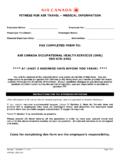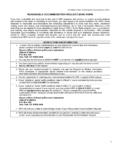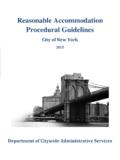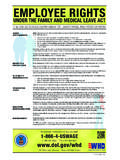Transcription of Confidential Personnel Information in the Workplace
1 Confidential Personnel Information in the Workplace by Linda McGill and Matthew Tarasevich Bernstein Shur Labor and Employment Practice Group June 22, 2012 100 Middle Street, Portland, ME 04104 | 207 774-1200 | Confidential Personnel Information in the Workplace By Linda McGill | Matthew Tarasevich 1. Acquiring Personal Personnel Information : In the Workplace , It Happens In the course of the employment relationship businesses acquire, generate and maintain significant personal Information about individual applicants and employees.
2 Data collection begins well before any employment relationship is formed, when a job seeker is typically asked to provide a history of his or her education, work experience, reasons for leaving previous employment, names of personal references and permission for the potential employer to delve further into background Information . At the next stage, materials on the applicant s credit history, past job performance, criminal records and Internet profile may be collected and scrutinized. Before final hiring the individual may have to take a substance abuse test, pre-employment physical, polygraph (in Maine, limited to law enforcement positions) or undergo other screening that generates even more sensitive, albeit presumably job-related, data.
3 Once the individual is hired, health and medical Information will be collected in the course of dealing with sick leave, family medical leave, health insurance benefits, fitness for duty exams and requests for reasonable accommodations or workers compensation claims. Other personal Information may find its way into the employer s files includes, family circumstances that affect job performance, romantic or sexual involvements with co-workers, conduct or habits that are the subject of a Workplace investigation, substance abuse problems, child support obligations and the like.
4 During the course of even the most uneventful employment relationship virtually every business amasses personal and private Information on its employees. Some of this Information , particularly when related to health or medical issues, is protected by statute from all but the most limited dissemination or use by the employer. Other Information is not specifically regulated but may be the source of invasion of privacy, defamation or other tort claims if it is wrongly publicized or otherwise misused, and although existing regulations are already somewhat complex, there is growing movement by state legislatures, congress, the Equal Employment Opportunity Commission (EEOC) and courts to impose further restrictions on employers access to and use of personal and private Information about applicants or employees.
5 In the digital age, when employers are able to collect more Information on their Personnel , but are under increasing pressure to protect that Information and to use it only as permitted by law, it is important for lawyers to know the legal landscape of managing Personnel Information in order to better advise both employers and individuals when these issues arise in the Workplace . 2. Current Laws Regulating the Collection, Maintenance and Dissemination of medical or Other Confidential Personnel Information Numerous laws currently regulate the collection, maintenance and dissemination of medical and other Confidential Personnel Information by employers in Maine.
6 The major sources of compliance requirements and/or potential liability, include: Maine Human Rights Act, 5 4572 Maine Freedom of Access Act, 1 401 (governmental employers) Confidential Personnel Records Law, 30-A 2702 (governmental employers) Americans with Disabilities Act Genetic Information and Non-Disclosure Act of 2008 Maine and Federal Family medical Leave Acts Fair Credit Reporting Act Common Law Right to Privacy 3. Key Provisions of Laws Regulating Confidentiality of Personnel Information Among the numerous legal mandates, limitations and regulations relevant to Personnel Information , the following are the most commonly invoked and enforced and therefore the most important for employer compliance: (a) MHRA and ADA.
7 Limiting Collection, Storage and Dissemination of medical Information The MHRA and ADA have similar restrictions on acquiring, maintaining and using medical Information generated from a pre-employment physical or other medical examination. Information about the medical condition or history of an applicant may legally be obtained if the same Information , typically in the form of a pre-employment physical, is required for all similarly-situated individuals who have received a conditional offer of employment. medical Information may be acquired during the employment relationship if it is job-related and consistent with business necessity.
8 Any medical Information , which includes Information received during the processing of sick leave, family medical leave requests, workers compensation, in disability claims or in any other context that is received by the employer, must be maintained on separate forms and in separate medical files, and must be treated as a Confidential medical record. The Information may not be accessed by or disseminated to any person in the Workplace except: Supervisors and managers who need to be informed about necessary restrictions on the work or duties of the employee and necessary accommodations First aid and safety Personnel , if an employee s disability might require emergency treatment Government officials investigating compliance with the MHRA or ADA, on request Violation of these limitations constitutes employment discrimination under both the MHRA and the ADA.
9 The Maine Federal District Court has recently underscored the strict limits on the use and sharing of employee medical Information imposed by the ADA, holding that the restrictions protect even arguably false medical Information and apply to intra-corporate disclosures. Blanco v. BIW, 2:10-CV-00429-JAW (July 2011) ruled that the company physician s report to the Labor Relations Department that the employee had failed to disclose his medical condition in his pre-employment medical questionnaire violated ADA's confidentiality provision. See also Bennett v.
10 Postal Service, 2011 WL 24417 ( Jan. 11, 2011) in which an employer that provided employee s medical records in response to a state subpoena without the employee s release, or some other exception under the ADA, violated the ADA s confidentiality restrictions. (b) Genetic Information Non-Disclosure Act: Prohibiting Acquisition of Genetic Information While the ADA and MHRA permit the acquisition of medical Information under certain prescribed and limited circumstances, the Genetic Information Non-Disclosure Act (GINA) prohibits employers with 15 or more employees from requesting, requiring or purchasing any genetic Information of applicants, employees and their family members at any time, including during the post-offer stage of employment, with extremely limited exceptions.





